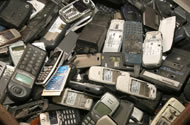Greenpeace has released a new report – Green Gadgets: Designing the Future – that assesses whether hi-tech manufacturing companies are achieving their pledged goals of eliminating hazardous chemicals, reducing their energy footprint and building sustainable supply chains. The report found that Apple leads the consumer electronics sector in addressing its environmental footprint. Greenpeace UK’s head of IT, Andrew Hatton, said: “Apple has shown us a glimpse of a greener future … but the industry still has a long road ahead of it before [it gives] customers the level of efficiency and sustainability they are asking for.”
More than 50% of the mobile phone market is now free from the worst hazardous substances: polyvinyl chloride (PVC) and brominated flame-retardants (BFRs). Unfortunately, the report says that Samsung, the world’s biggest electronics company, has failed to meet its elimination goals for products beyond mobile phones, joining Dell in backtracking on previous public phase-out commitments. Microsoft has also dropped its previous phase-out commitment, and rival Amazon is failing to provide any information to the public, the report claims.
The report says that, overall, electronics companies are failing to address their growing energy footprint. The manufacture of phones, laptops and other devices requires a huge amount of energy and is concentrated in East Asia, where coal dominates energy production. Some companies, such as Lenovo and Huawei, are setting a positive example with small solar installations on factories, while Apple is planning the first factory 100% powered by renewable energy to make iPhone screens. However, only ambitious targets to expand renewable energy use in supply chains will reduce the carbon footprint of our gadgets.
In 2014 sales of the most popular consumer electronics are predicted to reach 2.5 billion products. Such rapid growth has multiplied the industry’s environmental impact and raised questions around the sustainability of a prevailing business model that promotes ever-increasing consumption. “The innovative electronics industry [are] perfectly placed to reimagine their manufacturing and marketing processes. They’re designing our future, and we need that future to be a lot cleaner and greener than where we are now,” concludes Hatton.







